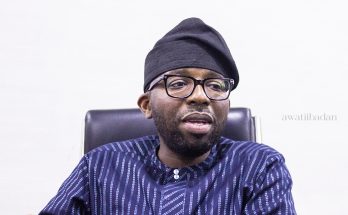
In 2018, the inaugural class of #ObamaFoundationScholars program kicked off last year and Edem Ossai was one of the 20 scholars selected out of 20,000 applications from all over Africa. The program came to an some days ago. Today, we revisit the work that gave Edem a seat among the Obama Foundation Scholars.
This is a re-run of the piece in 2016.
_________________-
“Alaka community is in Ojoo. The community has about 200 family households and roughly about 700 children and youths, below the age of eighteen. Many of these children attend the community secondary school – Ojoo High School, which is managed by the Oyo State government and grossly underfunded. The school has no functioning library or ICT facility and the concept of technology or computers as tools for learning is foreign to most youths of this community.
Furthermore, with only a few exceptions, majority of the households in Alaka community are low income earning and semi or illiterate. The most common forms of occupation of members of the community include petty trading, commercial driving, menial construction, and a wide range of artisan vocations such as tailoring, carpentry, plumbing, welding or auto-mechanic work. Not surprisingly there is a considerably high secondary school dropout rate amongst youth in the community. In Alaka, children are either constantly loitering or hawking items at unreasonable hours on instruction of parents and guardians. Youths on the other hand were often playing lotto or riding commercial motorcycles. My mother had her house there and I worked in Lagos at the time as an in-house counsel in a commercial law practice.
One weekend when I came home from Lagos to see my mother, I found one of the children in the neighbourhood defacing her compound wall. At that moment I knew within me that I had to take action otherwise the effects of the poor education which children in that community were receiving, would affect all of us. I quit my job Lagos and relocated to Ibadan in September 2011.
Between October 2011 and May 2012, I began running social impact projects for several months. I was the sole driver of the project at the time, and I introduced several leadership, academic and civic mentoring projects into 5 public secondary schools in Oyo State. In May 2012, MAYEIN was formally registered as an organization.

Our primary target at MAYEIN includes children and youth in disadvantaged or poor communities as well as those enrolled in public schools. We also focus on girl child empowerment and organise an annual leadership conference for school girls across both public and private schools.
I am especially excited about the impact we are recording in the area of promoting girl child education and empowerment. Do you know that Nigeria has more girls out of school than any other country globally? With our track record we seem to be condemning many girls to miserable unproductive futures.
Every year MAYEIN organizes a School Girls Conference, and the event has since held 2 editions, and has connected more than 300 school girls with leadership skills, peer advocacy skills, and mentoring opportunities. The goal of the ‘MAYEIN Annual School Girls Conference’ is to fire up the ambitions of young girls and empower them with skills for academic achievement, community impact and future roles in leadership.
We have held effective campaigns for free, safe and qualitative education for girls across major communities in the South-west part of Nigeria (Ibadan, Oyo State and Iwo town, Osun State) and reached over 800 individuals, including traditional rulers, religious leaders and policy makers.
Apart from this, we are determined to help children in poor communities gain access to opportunities for real learning. So far we operate mobile library services in a location servicing 3 disadvantaged communities in Ojoo, conduct book donation drives, carry out book reading campaigns, organize innovative reading programmes and work with local libraries to design effective community and schools outreach programmes for children. We have since connected over 500 children in Ojoo with books resources and helped improve their literacy skills, as measured through their vocabulary, spelling, narration and speed reading.
We also intend to launch two very important new projects. The first is “Technology Hour” wherein 200 teenagers in Alaka Community, who lack access to computer technology in their homes and schools, will be given practical instruction and basic training on how to use computers and some specific tools – e.g. Google, Micro-soft, Encarta etc, during an hourly session on Saturdays (part of an ongoing mobile library programme), in order to accelerate their learning and improve their chances of passing the national (computer-based) qualification exams into university.
Our goal is to reach 2 million Nigerian children and teenagers (both in-school and out-of-school) by the year 2020 and improve them through our programmes and community learning hubs.

(Ibadan, 2016)





